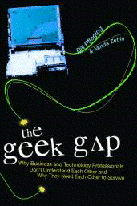Debates: The Medium Is the Message
Well, tonight was a first: the first presidential debate with questions submitted by YouTube.
Democrats, of course, ever the most tech-friendly, were the ones to try this out. In a memorable moment, Mary and Jen in Brooklyn asked the candidates if elected, would they allow them to be married...to each other? (Yes, said Dennis Kucinich, the others waffled about civil union.)
The reaction to the whole Dem-Tube phenomenon from the rest of the media appeared to be: Big Deal. After all, as columnist after columnist pointed out, the questions did not go straight to the candidates, but were screened and carefully selected.
Of course CNN screened the questions. First of all, there were more than 3,000 of them, so for the candidates to have answered them all would have taken more than 12.5 days. And, undoubtedly, some of those questions were rambling, incoherent, inaudible, or violated FCC profanity rules. I once found myself listening to a low-budget late-night talk show where the host was working alone, and with no one to screen calls for him had to take whatever came in. In one case, the caller simply shouted, "Fuck You!" and hung up. You just never know what kind of stuff is going to come rolling in.
So, yes, there was a gatekeeper, and the gatekeeper was CNN. It was no different from the traditional town-hall setup in which a carefully assembled audience of "ordinary people" asking carefully rehearsed questions.
Except that it was. The press missed the point, which was not whether or not the questions were screened, but what the use of YouTube says about the whole phenomenon of social networking and people posting their own material on the Internet. The point is that YouTube in an incredibly short time has grown to become a major venue for political advertising and debate only because it is so popular. And the reason it is so popular is that it dramatically demonstrates that people are intensely eager to see, hear and know...each other.
The Internet is the ideal medium for satisfying this desire, and it's provided that satisfaction in increasingly sophisticated ways, starting with online message boards and chat, now with video over YouTube and webcams that let us watch places all over the world.
What next? Well, perhaps wireless will be everywhere and webcams will be everywhere and anyone who wants will be able to see, hear and directly talk to anyone else, in real time. We lead lives that are increasingly segmented--most people these days socialize with their co-workers, no longer their neighbors, so perhaps some of us yearn to break out of this segmentation and see what people we don't already know are actually like.
And that's the message here, for politicians: Americans yearn to see and hear from each other and they're using social networking sites to do it. We like those sites because they give us a sense of connection and a look at who the other people on them really are. The only way to make these things work as a political strategy is to find a way to do the same.
Democrats, of course, ever the most tech-friendly, were the ones to try this out. In a memorable moment, Mary and Jen in Brooklyn asked the candidates if elected, would they allow them to be married...to each other? (Yes, said Dennis Kucinich, the others waffled about civil union.)
The reaction to the whole Dem-Tube phenomenon from the rest of the media appeared to be: Big Deal. After all, as columnist after columnist pointed out, the questions did not go straight to the candidates, but were screened and carefully selected.
Of course CNN screened the questions. First of all, there were more than 3,000 of them, so for the candidates to have answered them all would have taken more than 12.5 days. And, undoubtedly, some of those questions were rambling, incoherent, inaudible, or violated FCC profanity rules. I once found myself listening to a low-budget late-night talk show where the host was working alone, and with no one to screen calls for him had to take whatever came in. In one case, the caller simply shouted, "Fuck You!" and hung up. You just never know what kind of stuff is going to come rolling in.
So, yes, there was a gatekeeper, and the gatekeeper was CNN. It was no different from the traditional town-hall setup in which a carefully assembled audience of "ordinary people" asking carefully rehearsed questions.
Except that it was. The press missed the point, which was not whether or not the questions were screened, but what the use of YouTube says about the whole phenomenon of social networking and people posting their own material on the Internet. The point is that YouTube in an incredibly short time has grown to become a major venue for political advertising and debate only because it is so popular. And the reason it is so popular is that it dramatically demonstrates that people are intensely eager to see, hear and know...each other.
The Internet is the ideal medium for satisfying this desire, and it's provided that satisfaction in increasingly sophisticated ways, starting with online message boards and chat, now with video over YouTube and webcams that let us watch places all over the world.
What next? Well, perhaps wireless will be everywhere and webcams will be everywhere and anyone who wants will be able to see, hear and directly talk to anyone else, in real time. We lead lives that are increasingly segmented--most people these days socialize with their co-workers, no longer their neighbors, so perhaps some of us yearn to break out of this segmentation and see what people we don't already know are actually like.
And that's the message here, for politicians: Americans yearn to see and hear from each other and they're using social networking sites to do it. We like those sites because they give us a sense of connection and a look at who the other people on them really are. The only way to make these things work as a political strategy is to find a way to do the same.



0 Comments:
Post a Comment
Subscribe to Post Comments [Atom]
<< Home